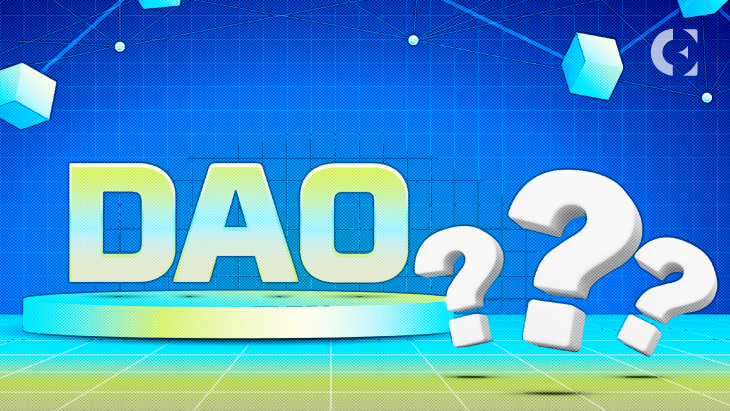What is a Decentralized Autonomous Organization?
Roughly speaking, a Decentralized Autonomous Organization (DAO) is an organization run by a set of codes agreed upon by the members of the DAO. It is fully autonomous and transparent: smart contracts make up for the foundation rules and execute the final decision.
Additionally, a DAO does not contain any chief executive officers (CEOs) or any hierarchical management. All decisions are made through member votes during a certain period and then the majority of the votes are chosen.
How Does it Work?
As mentioned above, a DAO is an organization where decisions get made and voted on by members. Usually, the proposal will only pass once the majority of stakeholders approve it. Anyone can participate just by owning a token. The ones with the most tokens have more influence in the proposal system.
The rules of a DAO are made by a core team of community members through the use of smart contracts. In detail, these are codes that execute automatically when a set of rules are satisfied. Once these rules are written onto the blockchain, the next step is funding.
Funding is generally done using the token issuance method, wherein the protocol sells tokens in exchange for funds. People who receive tokens are given certain voting rights based on their holdings. The stakeholders of the DAO decide the rules and these rules and transaction records are stored on a blockchain with complete transparency.
Once the code has been finalized it can no longer be tampered with outside of the proposal system. Even if, hypothetically, government officials demand you to shut down the DAO, it simply won’t be possible. Only the proposal system can decide the direction of a DAO. These proposals are influenced the most by members with large amounts of tokens.
Advantages of DAO
No Hierarchical Management
Traditional organizations are run by key leaders, whereas DAOs operate through computer code. Blockchain-based governance ensures that no single individual controls the community. Therefore, all decisions are made faster and in a transparent environment.
Use of Smart Contracts
DAOs derive their consensus via digital contracts that exist on the blockchain. There are a set of rules that execute once specific conditions are met. The algorithms integrate sophisticated data and do not require human direction.
Read Also : What Is a Smart Contract and How Does It Work? A Beginners Guide
Trust and Transparency
DAO offers trust and transparency for entities to focus on achieving their collective interests. The participants do not need to get to know each other as the rules of engagement are embedded in a transparent, safe, and open-source blockchain record. Because the blockchain ledger is tamperproof, no participant can alter the practices without a majority vote.
Open Source Code
A DAO’s code is out there for anyone to view and improve on. Open-source projects are often more reliable simply because programmers can contribute to the wellness of the project. Usually by finding bugs and finding ways to improve the code.
Disadvantages of DAO
Vulnerability of Code
Anyone can look at the code of a DAO and that includes malicious actors. Attackers can observe how the code works and attack vulnerable areas. Additionally, if attackers study the code, they could launch reverse-engineer-attacks and even test the code before deploying it.
Time-Consuming
Making decisions in DAO can be a time-consuming process since there is no set of people or predetermined boardroom members who can take all the decisions. In fact, the involvement of a great number of voting participants results in the decision taking more time.
Unequal Voting Power
DAOs rely prominently relies on the possession of DAO tokens. While DAOs are intended to offer seamless accessibility, a specific group of investors can accumulate major shares of DAO tokens. As a result, they would gain higher voting power.
Examples of DAOs
Uniswap
One of the most important dApps in the crypto world. Uniswap (UNI) is a community-based decentralized exchange first built on the Ethereum network. For its size and history, Uniswap is one of the best examples of DAOs that exist. Anyone can become a member by holding the UNI token, the native token, which gives voting rights.
The DAO
Great start gone wrong. The DAO, a venture capitalist fund created in 2016, was well known for its failure. The DAO was one of the earliest attempts to build a decentralized financial (DeFi) network for crowdfunding venture capital. A group of attackers exposed its vulnerabilities and stole about $70 million worth of Ethereum (ETH) tokens. The Ethereum blockchain had to be hard-forked to returned the funds to the original owners. This essentially split the blockchain into two separate chains – Ethereum and Ethereum Classic.
Decentraland
Decentraland is a 3D virtual world browser-based platform where players can buy and sell land and estates. This online game is governed by a DAO, where administrative and governance decisions are democratically taken by the stakeholders. Anyone who owns the native token known as MANA can take part in the process, and the platform is quickly becoming popular with global brands such as Coca-Cola and Adidas.
Conclusion
The concept of DAO is interesting to most. It has the potential to forever change how organizations and companies operate. Although DAOs may not be a fit for each business, they have multiple features that can make processes in a company more efficient. The Ethereum development project has been improving rapidly, and its future looks promising.
Disclaimer: The information presented in this article is for informational and educational purposes only. The article does not constitute financial advice or advice of any kind. Coin Edition is not responsible for any losses incurred as a result of the utilization of content, products, or services mentioned. Readers are advised to exercise caution before taking any action related to the company.









